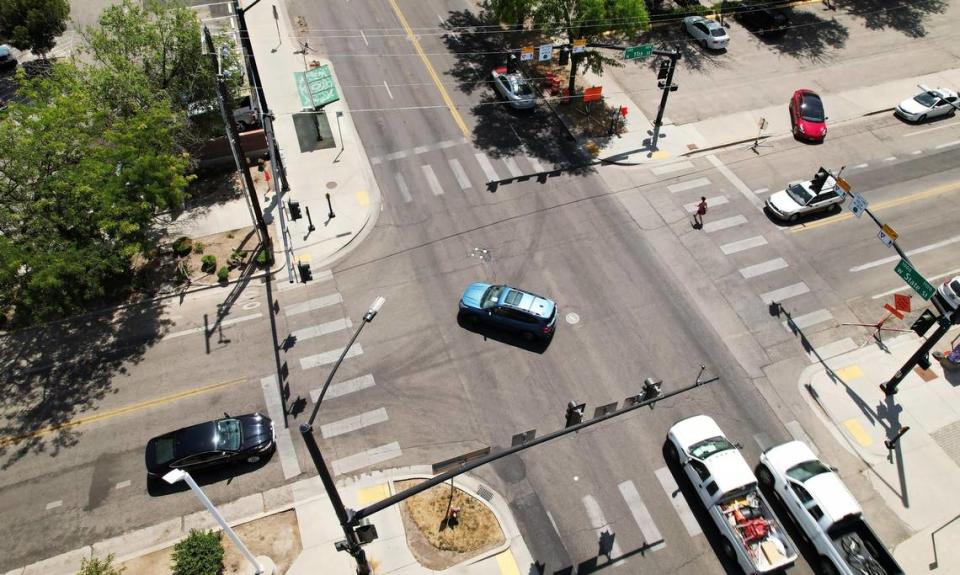‘So angry with myself:’ Judge sentences driver who killed man at YMCA crosswalk in Boise
Rows of supporters filled benches and held tissue boxes on both sides of the courtroom Tuesday morning during the sentencing of a Meridian man who pleaded guilty to felony manslaughter while driving under the influence.
Kellen Tutt, 41, hit a man while driving in a Boise intersection on Jan. 23, 2023. The victim, Henry Reents, 79, of Boise, died from his injuries two days later.
“It makes me so angry with myself that my actions have had such an effect on you, Henry, and all those it sounds like he touched with his big heart,” Tutt said tearfully in court.
After emotional statements from the defense, Judge Peter Barton sentenced Tutt to at least two years in prison, with seven years indeterminate, for the charge. That means he could be eligible for parole after serving 24 months.
The sentence was lighter than the prosecution’s request of four years fixed, 11 years indeterminate.
Ada County Prosecuting Attorney Nolan Knuth said that after Tutt dropped his daughter off at the YMCA, Tutt turned left from West State Street onto N. 11th Street. His truck hit Reents, who had been walking north across State Street to get to the Y, Boise police said. Reents flew several feet and sustained serious injuries, according to Knuth.
His wife, former state Sen. Sue Reents, previously told the Idaho Statesman that she had contacted the Ada County Highway District about the dangers of crossing that intersection more than a decade ago, but nothing was done.
Since the accident, however, ACHD has made changes to add increased protection for pedestrians at that intersection, including warning lights and an adjusted crossing time.
After hitting the victim, Tutt stopped his truck at the intersection, checked on Reents, and then moved his truck to a nearby parking lot, according to defense attorney Mistie Bauscher. Knuth said he threw empty alcohol cans, which tested positive for Tutt’s DNA, into nearby bushes before returning to the victim. At some point, Tutt called 911 and told the operator that he had hit someone, Bauscher said.
A blood test revealed Tutt’s blood alcohol content to be 0.134, easily exceeding the 0.08 legal limit. Knuth speculated that because of a time gap, his BAC could have been higher while he was driving.
A misdemeanor charge for transporting a minor while under the influence was dismissed by the court through a plea agreement, court records show.

The first thing Fourth District Judge Peter Barton did Tuesday morning was ask the court to wait while Tutt left for a drug and alcohol test.
Barton asked Tutt what the result would be.
“Negative, your honor,” Tutt said.
The results, the judge confirmed, indeed showed that.
Mistie said Tutt spent the past year focused on overcoming alcoholism, including attending Alcoholics Anonymous meetings 100 times in 100 days. His sponsors submitted letters of support. He had reached “freedom from alcohol, which is something he’s never been able to achieve before,” Mistie said.
“As you have seen, I am on the right path,” Tutt told the court. “... Sobriety has been a game changer in our family and daily life.”
Tutt’s wife asked the judge to consider the “lasting impact” his sentence would have on his four children, the youngest of whom is 9 months old.
“They’ll be absolutely crushed when their dad can’t hold them tight at the end of the day,” she said.
None of the victim’s family members made statements in court, but the prosecution said they submitted letters.
Barton said his highest priority as a judge was to protect society as a whole.
“You can talk about how much you are a victim of disease, how much you are controlled by this, but there’s a moment when you choose to drive,” Barton said. “That moment of driving is a choice to put yourself at risk and to put other people at risk.”
In addition to prison time, Barton ordered Tutt’s license to be suspended for seven years after his release. He also must pay $1,793 in restitution.

